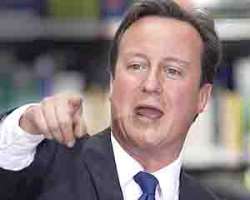On United Kingdom Election

Before the 2015 Nigerian presidential election, I made several predictions on my Facebook, Twitter, LinkedIn and my Word Press accounts about the elections all which went in favour of the All Progressives Congress(APC), the eventual winner.
This made some people see me as an incurable “progressive” or “socialist ideologue.” I was accused severally of being too partisan. What my critics perhaps fail to realise or never talk about is that I predicted victory for the Conservative Party during the May 7, 2015 British parliamentary election on my Facebook profile ( https://www.facebook.com/adigundelaw?fref=nf&pnref=story ).
Before writing this article, I thought about the title, “A Vote for the Tories” as a more appropriate title for this article. For unexplainable reasons, I decided otherwise. What my critics perhaps will also fail to realise is that if I were to vote in United Kingdom elections, the Tories will most likely have my vote. This last statement will surely be greeted with a rude shock from some of my comrades many of whom are only aware of my “progressive” views, but are yet to bother to find out my support for the US Republicans and the UK Conservatives.
My support for the Tories steams from the fact that two of the greatest British Prime Ministers: Winston Churchill and Margaret Thatcher, both of whom incidentally are my role models. Churchill is regarded as the World War II hero while Thatcher is reputed to have restored British confidence and position in world politics with British victory in the Falkland War in 1982.
Most, if not all, pre-election opinion polls predicted victory for the Labour Party. I have no qualms with pre-election polls neither do I fault their methods of their research. Many Labour supporters went into wide jubilation expecting victory for the socialists. I received several knocks here in Nigeria for daring to take sides with the Tories, though I never bothered.
In the said Facebook post, I argued that it is relatively easier for Tories to win an election or are-election than their Labour counterpart. The fact that the party is still the only traditional party in existence attests to its history and tradition in British politics. It may surprise many that the Whigs(Liberals) finds it easy to go into a coalition with their traditional rival, Tory, than with Labour.
For the Tories to lose a re-election bid it can either mean the Conservatives have performedso poorly on the Key Performance Indexes (KPIs) or there are irreconcilable conflicts within its ranks as witnessed immediately after Thatcher resigned between her supporters and the “wets”. None of these happened before the May 7 elections which made me doubt the source of optimism for the Labour supporters.
The second factor, in my estimation, that shaped the outcome of the election is the continued British relationship with the European Union (EU). It was Tory Prime Minister Edward Heath that took Britain into the European Community in 1973. The Labour Prime Minister Harold Wilson approved the referendum for Britain to formally become a member of the Union in 1975.
Recently, there were concerns over about British continued membership of the Union. These concerns gave rise to the right-wing UK Independence Party(UKIP) whose only manifesto is to seek to pull out Britain from the Union, if voted into power.
Labour strategists intended to cash-in on this seeming division of the right with the growing UKIP popularity, though it perhaps took its optimism too far. The issues surrounding the election were too complicated to be reduced to the EU membership. May be the socialists overhyped the UKIP power in this regard!
The third or most important issue, if you ask me, which shaped the election, is the question of the Scottish independence referendum. In 2014, the Westminster Government approved the Edinburgh government’s request for a referendum to determine Scottish continued existence in the United Kingdom. The matter, as usual, became an issue that attracted the interest of the two leading parties. The Scottish Labour Party(SLP) supported by its London ally which supported Scottish independence. On the other hand, the Scottish National Party(SNP) a Tory ally stood for Scottish continued existence in the UK. The fact that Labour had an uncoordinated position on this issue shows how vulnerable they are strategically.
The initial approval itself, according to critics, is dubious. One wonders why such approval has never been granted to Northern Ireland which is hell bent on joining their “brothers” in the Republic of Ireland. Dubious as the decision may be, Labour will for years remember their poor, uncoordinated stance on this issue as a reference point for their defeat in May 7. The SLP’s ego was seriously deflated hence resulting in a decisive defeat in Scotland, once a Labour stronghold.
For all these, I concluded that even though the victory will be slim, David Cameron will serve a second term at No 10 Downing Street. This is more than emotion, it is about facts. This will serve as a lesson for political pollsters, psephologists, strategists, and political risk analysts to learn!
ABOUT THE AUTHOR
OlalekanWaheed ADIGUN is of many parts. He is a writer, philosopher, academic, political risk analyst and researcher. He also an independent political strategist and brand consultant for political campaigns and organizations based in Lagos.
His write-ups can be viewed on his website http://olalekanadigun.com/
Tel: +2348136502040, +2347081901080
Email: [email protected]
Twitter @adgorwell
